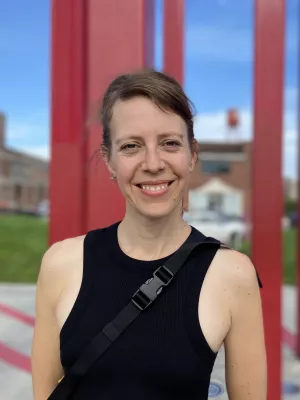
Melissa García
Associate senior lecturer

The right to the unhealthy deprived city : An exploration into the impacts of state-led redevelopment projects on the determinants of mental health
Author
Summary, in English
Research shows mental health is impacted by poor-quality physical and social-environmental conditions. Subsequently state-led redevelopment/regeneration schemes focus on improving the physical environment, to provide better social-environmental conditions, addressing spatial and socioeconomic inequities thus improving residents' health. However, recent research suggests that redevelopment/regeneration schemes often trigger gentrification, resulting in new spatial and socioeconomic inequalities that may worsen health outcomes, including mental health, for long-term neighborhood residents. Using the right to the city and situating this within the framework of accumulation by dispossession and capitalist hegemony, this paper explores the potential mechanisms in which poor mental health outcomes may endure in neighborhoods despite the implementation of redevelopment/regeneration projects. To do so, we explored two neighborhoods in the city of Glasgow — North Glasgow and East End – and conducted a strong qualitative study based on 25 in-depth semi-structured interviews with key stakeholders. The results show that postindustrial vacant and derelict land spaces and socioeconomic deprivation in North and East Glasgow are potential mechanisms contributing to the poor mental health of its residents. Where redevelopment/regeneration projects prioritize economic goals, it is often at the expense of social(health) outcomes. Instead, economic investment instigates processes of gentrification, where long-term neighborhood residents are excluded from accessing collective urban life and its (health) benefits. Moreover, these residents are continually excluded from participation in decision-making and are unable to shape the urban environment. In summary, we found a number of potential mechanisms that may contribute to enduring poor mental health outcomes despite the existence of redevelopment/regeneration projects. Projects instead have negative consequences for the determinants of mental health, reinforcing existing inequalities, disempowering original long-term neighborhood residents and only providing the “right” to the unhealthy deprived city. We define this as the impossibility to benefit from material opportunities, public spaces, goods and services and the inability to shape city transformations.
Publishing year
2023-02
Language
English
Publication/Series
Social Science and Medicine
Volume
318
Links
Document type
Journal article
Publisher
Elsevier
Topic
- Public Health, Global Health, Social Medicine and Epidemiology
- Architectural Engineering
Keywords
- Accumulation by dispossession
- Capitalist hegemony
- Disempowerment
- Displacement
- Gentrification
- Mental health
- Redevelopment
- Right to the city
Status
Published
ISBN/ISSN/Other
- ISSN: 0277-9536